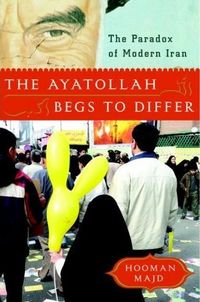

Purchase
The Ayatollah Begs to Differ
Hooman Majd
The Paradox of Modern Iran
Doubleday
October 2008
On Sale: September 23, 2008
256 pages
ISBN: 0385523343
EAN: 9780385523349
Hardcover
Add to Wish List
Non-Fiction Political
A revealing look at Iran by an American journalist with an
insider’s access behind Persian walls The grandson of an eminent ayatollah and the son of an
Iranian diplomat, now an American citizen, Hooman Majd is,
in a way, both 100 percent Iranian and 100 percent
American, combining an insider’s knowledge of how Iran
works with a remarkable ability to explain its history and
its quirks to Western readers. In The Ayatollah Begs to
Differ, he paints a portrait of a country that is fiercely
proud of its Persian heritage, mystified by its outsider
status, and scornful of the idea that the United States can
dictate how it should interact with the community of
nations.
With wit, style, and an unusual ability to get past the
typical sound bite on Iran, Majd reveals the paradoxes
inherent in the Iranian character which have baffled
Americans for more than thirty years. Meeting with
sartorially challenged government officials in the
presidential palace; smoking opium with an addicted cleric,
his family, and friends; drinking fine whiskey at parties
in fashionable North Tehran; and gingerly self-flagellating
in a celebration of Ashura, Majd takes readers on a rare
tour of Iran and shares insights shaped by his complex
heritage. He considers Iran as a Muslim country, as a
Shiite country, and, perhaps above all, as a Persian one.
Majd shows that as Shiites marked by an inferiority
complex, and Persians marked by a superiority complex,
Iranians are fiercely devoted to protecting their rights, a
factor that has contributed to their intransigence over
their nuclear programs. He points to the importance of the
Persian view of privacy, arguing that the stability of the
current regime owes much to the freedom Iranians have to
behave as they wish behind “Persian walls.” And with wry
affection, Majd describes the Persian concept of ta’arouf,
an exaggerated form of polite self-deprecation that may
explain some of Iranian President Ahmadinejad’s more
bizarre public moments.
With unforgettable portraits of Iranians, from government
figures to women cab drivers to reform-minded Ayatollahs,
Majd brings to life a country that is deeply religious yet
highly cosmopolitan, authoritarian yet with democratic and
reformist traditions—an Iran that is a more nuanced nemesis
to the United States than it is typically portrayed to be.
Comments
No comments posted.
Registered users may leave comments.
Log in or register now!
| 


 © 2003-2024 off-the-edge.net
all rights reserved Privacy Policy
© 2003-2024 off-the-edge.net
all rights reserved Privacy Policy